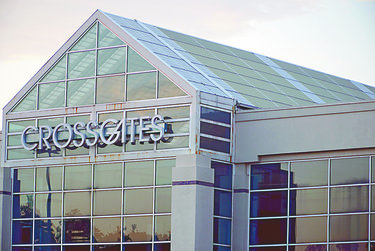Crossgates is behind on its loans again, down on income, still fighting assessment
GUILDERLAND — Facing default on $157 million in loan payments, Crossgates Mall once again finds itself behind the eight ball with creditors.
At the same time, the Pyramid Management Group, Crossgates’ parent company, is facing foreclosure on its mall in Rockland County.
Bloomberg reported on Feb. 17 that Pyramid was facing an “imminent monetary default” on two loans totaling $157 million. The remaining loan wasn’t flagged as delinquent, according to Bloomberg.
Crossgates has approximately $248 million left on its 2012 mortgage, down from nearly $300 million. The mall also has millions in construction loans waiting to be paid off.
Over the course of three months last summer, Pyramid unloaded three of its properties near Crossgates.
In May, it sold for $605,000 a 1.5-acre parcel of land bounded on two sides by Crossgates Mall Road, the Hilton hotel’s driveway on another, and by the hotel itself on the remaining side.
In June, a project the company had shepherded through two years of legal wrangling and municipal approvals got a new owner when Pyramid sold a nearly 20-acre parcel on the Macy’s end of Crossgates Mall for $5.43 million to the United Group of Companies out of Troy.
And in August, a hospitality company from Maine paid $30.3 million for the dual-branded Hilton.
Another Pyramid-owned property on Western Avenue is being developed into self-storage facility by a third party and is in the process of receiving approvals from the town, after which the developer will take ownership of the parcel.
Dollars and cents
Recently, Crossgates’ financials have taken a hit after rebounding from the pandemic. The most-recent available data shows the mall repeatedly underperformed in 2022 compared to the year prior.
During the first three months of 2022, Crossgates had a net-operating income of about $6.9 million, down from $7.55 million for January through March of 2021.
For the first half of 2022, Crossgates’ operating income was about $13.2 million, down from $14.4 million for the first six months of 2021. And, for January through September of last year, the mall had had a net-operating income of $18.9 million, compared to $20.5 million for the same period in 2021.
Net operating income is a formula used to analyze the profitability of an income-generating real-estate asset. To find net operating income, “all reasonably necessary operating expenses,” like property-management fees, insurance, property taxes, and property upkeep are subtracted from revenue, which, in the case of Crossgates, comes from rent.
The news on Crossgates facing default on its loan is just the latest in a recent bad run for its owner, Pyramid, which is facing foreclosure on another one of its properties.
After receiving a $418.5 million loan on its Palisades Center Mall in Rockland County in 2016, the company was recently sued by the bondholders who footed the bill for the original loan; that loan’s outstanding balance is the same today as it was seven years ago: $418.5 million.
Credit-rating agency Morningstar currently monitors 17 loans associated with Pyramid-owned properties; five have been watchlisted by their banks, meaning the “loans that are at an elevated risk of default due to certain triggers, performance issue(s), upcoming maturity, etc.”
Pyramid’s liability on the mortgages is about $1.55 billion, which is only $160 million off from the company’s original collective balance of $1.71 billion; 12 of Pyramid’s 17 loans have been on the company’s books for at least a decade, while four others originated in either 2014 or 2016, according to Morningstar.
Lawsuits
Over the last three years, if Pyramid and Crossgates weren’t dealing with bankers, the mall and its parent company found themselves busy with lawyers.
Pyramid and the town of Guilderland beat back multiple lawsuits over the company’s planned Costco Wholesale store on Western Avenue and its then-proposal for apartments on Rapp Road, which has since been taken over by the United Group.
With the pandemic pummeling retail, Crossgates found itself at odds with a number of tenants over their lack of lease payments. The mall filed 15 lawsuits against its tenants for nonpayment of rent during the pandemic, 10 of which owed Crossgates at least a collective $1.9 million in combined derelict lease payments as early as October 2020.
In 2019, the mall received about $29.4 million in rent from its tenants; by the following year, that number had dropped to $18.5 million, a 37-percent decline.
An appraisal submitted as part of Crossgates’ tax lawsuit against Guilderland noted there had been an uptick in rent abatements from 2019 to 2021. Abatements are “negotiated to forgive a portion of contract rent based on the tenant’s declining sales performance,” and for Crossgates tenants, the abatements increased from $70,000 in 2019; to $772,635 in 2020; to $3,638,367 in 2021.
The lawsuits have now largely been settled.
Taxes
Still to be determined is Crossgates’ tax bill.
The mall in July of last year filed its third-straight Article 7 petition, requesting its assessed value be lowered by more than 50 percent, from $234 million — which the town had already reduced from $282 million — to $109 million.
In its first suit, filed in July 2020, Crossgates cited the impact of the pandemic and the yearslong decline of brick-and-mortar retail as reasons why the Albany County Court judge overseeing the case should lop off $139 million from its then-$282 million tax assessment.
A year later, the mall filed another tax certiorari suit against the town, offering reasoning similar to that filed in its 2020 petition as to why Justice Margaret Walsh should slash $162.5 million from its then-assessed value of $282.5 million.
The town appraisal, submitted as part of the certiorari proceedings, estimated Crossgates’ tax bill would have been $6.98 million for 2020 and would have been $7.02 million for 2021. However, the appraisal stated, “because the assessments are under appeal, the eventual actual real estate taxes are unknown.”
In tax year 2019, the seven parcels of land that collectively made up Crossgates paid taxing jurisdictions within Guilderland — the town itself; Guilderland schools; and the public library — about $7 million in taxes.
For now, the two sides continue their protracted battle of legal filings, something Crossgates knows a thing or two about, having previously and repeatedly dragged out tax certiorari proceedings against Guilderland. The mall filed individual challenges to its assessments for the tax years 1993-1994, 1994-1995, 1995-1996, 1996-1997, and 1997-1998.
Finally, in 2002, the town moved to have the proceedings dismissed because Pyramid hadn’t filed any paperwork in the matter for four years. In 2003, a judge ruled in favor of the town and ordered Pyramid to pay Guilderland’s court costs of $1 million. But the issue dragged on for another two years.
If Crossgates were to win its current lawsuit, the property taxes it pays could be cut by about half.




Since Crossgates mall is in financial distress (as usual) they should have sold off part of the parking lot for building a self storage unit and unsightly hotel. Since paradise is being paved and paved and paved, why not build on pavement, that’s already been destroyed rather than chopping up new areas of the Pine Bush ecosystem and surrounding areas in the town? Crossgates always has their hand out. Citizens have been saying for years that the mall will eventually fail, malls are being shuttered in many places. That destroyed space should be used in a sustainable way. Preserve open space for the planet. Maybe if Crossgates allowed a solar farm on the roof tops of their mall they could pay some of their bills and if Costco would build in the parking lot green space could be preserved, maybe Crossgates could pay their bills like the rest of us have to. What a scar on the earth and the town.